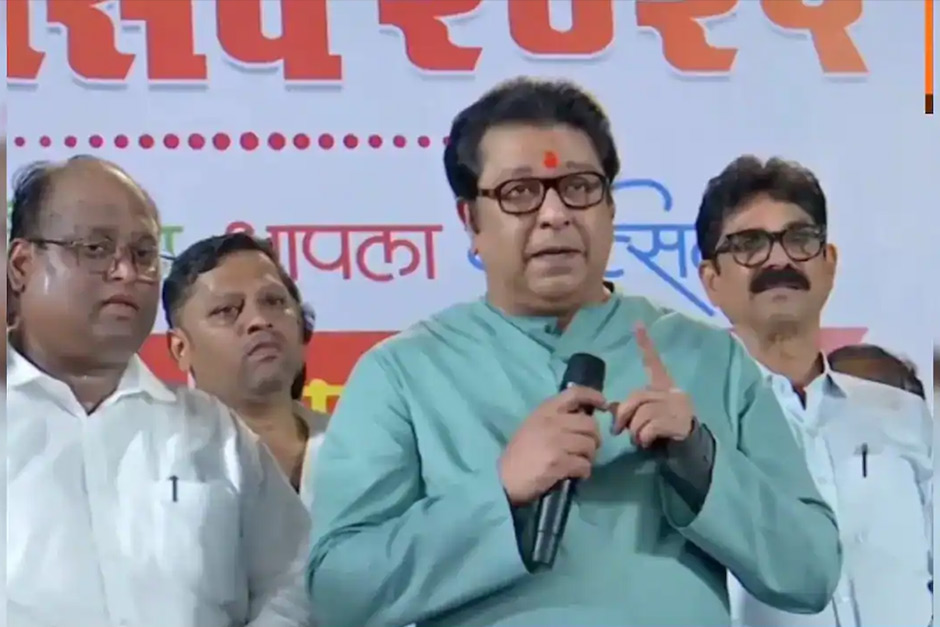As the Brihanmumbai Municipal Corporation (BMC) elections loom on the horizon, the political temperature in Maharashtra, particularly in its bustling capital Mumbai, has reached a fever pitch. At the heart of this escalating rhetoric is Maharashtra Navnirman Sena (MNS) chief Raj Thackeray, who recently delivered a stark warning to the ‘Marathi manoos’ (Marathi people), urging them to vote decisively or risk losing their cultural and linguistic identity in Mumbai. His pronouncement – an impassioned plea to consider this the “last election” to safeguard Marathi interests – has sent ripples across the state’s political landscape, underscoring the high stakes involved in the upcoming polls.
Thackeray’s message, delivered with his characteristic fiery oratorical style, is not merely a call to action but a profound statement on identity politics, demographic shifts, and the future of Mumbai. It reignites the long-standing debate about who truly belongs to Mumbai and the preservation of Marathi culture in a city that is a melting pot of diverse communities. For the MNS, a party founded on the principles of Marathi pride and regional identity, this election is being framed as an existential battle.
The Clarion Call: A Warning to ‘Marathi Maanoos’
Addressing a rally, Raj Thackeray minced no words, cautioning the Marathi electorate that if they fail to unite and vote for candidates committed to Marathi causes, Mumbai’s original inhabitants risk becoming a minority in their own city. The MNS chief, a prominent voice for Marathi identity, asserted that inaction would lead to irreversible demographic changes, potentially threatening the city’s Marathi character and cultural heritage. His warning, “This is your last chance. If you do not vote for Marathi candidates who will protect your interests, then understand that this is the last election where you can assert your identity. Mumbai will become a separate entity, and you, the Marathi people, will lose your hold,” resonated deeply with his core base, evoking a sense of urgency and impending crisis.
This warning taps into a sentiment that has historically driven the MNS since its inception in 2006 – the protection and promotion of Marathi language, culture, and economic interests. Thackeray’s rhetoric often highlights the perceived marginalisation of Marathis in their own land, particularly concerning employment opportunities and the influx of migrants. By framing the BMC elections as a ‘last election,’ he aims to galvanize the Marathi vote bank, appealing to their sense of belonging and cultural preservation. The narrative suggests that the upcoming polls are not just about civic governance but about securing the very essence of Mumbai as a Marathi-dominated metropolis.
Beyond the Slogan: MNS’s Political Strategy and the BMC Stakes
Raj Thackeray’s potent ‘last election’ warning serves multiple strategic purposes for the MNS, a party that has seen a fluctuating electoral performance over the years. With the Shiv Sena, traditionally the torchbearer of Marathi pride, now fractured into two major factions – Shiv Sena (Uddhav Balasaheb Thackeray) and Shiv Sena (Eknath Shinde) – the MNS sees an opportunity to reclaim some of its lost ground and consolidate the Marathi vote. By presenting himself as the uncompromising champion of Marathi identity, Thackeray aims to differentiate MNS from other parties vying for the same electorate, especially the BJP, which has its own ambitions in Mumbai.
The Brihanmumbai Municipal Corporation is not just any civic body; it is Asia’s richest municipal corporation, with an annual budget that rivals that of some smaller states. Controlling the BMC grants immense political power, patronage, and resources. For decades, it has been a crucial stepping stone for parties aiming for state-level dominance. For the MNS, winning a significant number of seats in the BMC would not only provide a platform to implement its Marathi agenda but also inject much-needed vitality into its political fortunes ahead of the 2024 state assembly and parliamentary elections.
Thackeray’s impassioned plea underscores the party’s long-term vision and its immediate electoral battle. The challenge for the MNS, however, lies in converting this emotional appeal into concrete votes amidst a highly fragmented political landscape. With the BJP, Shiv Sena factions, NCP, and Congress all vying for influence, the ‘Marathi manoos’ vote itself is diverse and contested. The upcoming BMC elections will undoubtedly be a crucial test for Raj Thackeray’s leadership and the enduring resonance of the MNS’s core ideology. Whether his dire warning will unite the Marathi electorate and translate into a significant electoral swing remains to be seen, but it has certainly set the stage for one of Mumbai’s most keenly watched civic polls.
The stakes are undeniably high, not just for the MNS, but for the broader political narrative surrounding identity, development, and control over India’s financial capital. The results will offer a clear indicator of how deeply Thackeray’s “last election” warning has penetrated the consciousness of the Marathi voters and their ultimate choice for Mumbai’s future.




